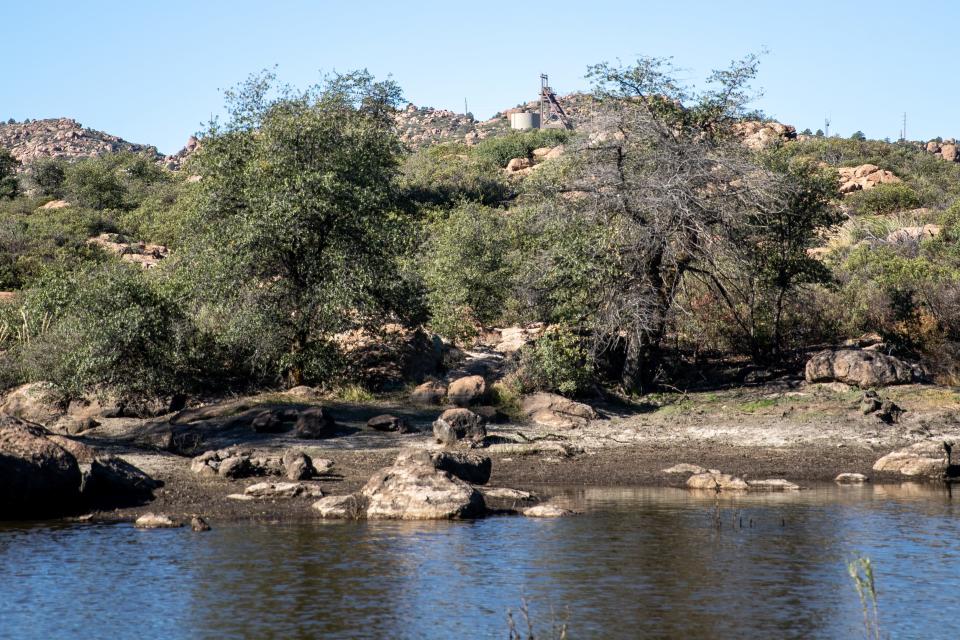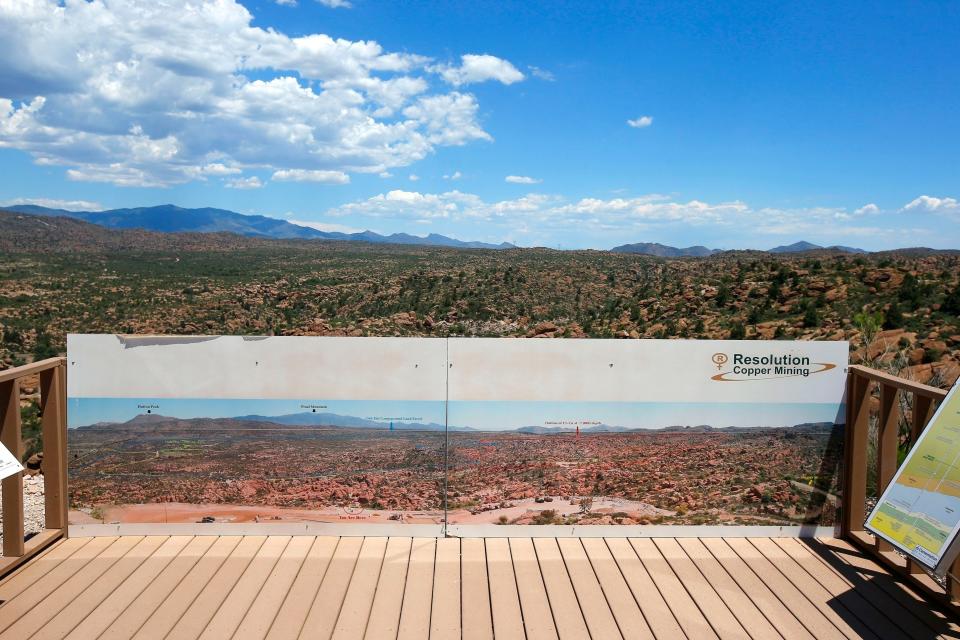Tribal leaders converge in front of White House with message: 'Save Oak Flat'
- Oops!Something went wrong.Please try again later.
Opponents of a proposed copper mine east of Phoenix that would obliterate one of the Apache peoples' most sacred sites held a prayer vigil across the street from the White House on Wednesday as rumors swirled that the Biden administration is close to clearing the way for a land exchange sought by the mine's operators.
Tribal leaders were joined by congressional representatives, young activists, environmentalists and elders to pray, sing and convey a clear message: "Save Oak Flat and our other sacred places."
U.S. Rep. Raul Grijalva, D-Ariz., who has pushed to block the land swap, joined with Apache leaders and other congressional representatives to call for President Joe Biden to stop the mine.
"We're here to pray that Biden reverses the destruction of a sacred site," Grijalva said.
Previous administrations have not supported tribal sacred sites, and Biden has the opportunity to reverse that, Grijalva said. And, he said, it's not just sacred sites but water that is at stake.
Tribes, environmentalists and recreationists have fought to prevent the federal government from handing over Oak Flat, a 2,200-acre campground and riparian zone on Tonto National Forest Land, to Resolution Copper, a mining company that convinced Congress to swap the site for several plots of environmentally sensitive land in 2014.

Resolution's proposal would render Oak Flat useless for religious practices or other activities because the mining method they would use to extract the ore would cause the site to collapse into a 2-mile-wide, 1,000-foot-deep crater.
Rep. Melanie Stansbury, D-N.M., said a huge multinational copper corporation is seeking to obliterate the sacred site. "If they get the land, they will strip mine a crater taller than the Washington Monument."
Rep. Theresa Leger Fernandez, D-N.M., said she hopes the prayers and messages from the vigil made their way across the street to the White House and down the street to Congress. "They have not paid attention to what they need to pay attention to," she said.
San Carlos Apache Tribal Vice Chairman Tao Etpison, who emceed the vigil, said the copper would end up exported to China because only three mills in the U.S. are capable of processing the ore.

Quechan Tribal President Jordan Joaquin said, "We don't need another mine to be dug into the ground." He said they are digging into the DNA from tribal ancestors. The reissuance of the environmental impact statement would be detrimental to tribes across the U.S., he said. "Just say no more."
"They're killing the land, the water and culture," said Quechan Council Member Jonathan Koteen. He offered a prayer song in support of the Apache people. The Quechan Tribe has successfully fought mining on and near sacred lands on BLM lands north of their current tribal lands in Imperial County, California.
'Snake's blood': Quechan Tribe prepares for a fight over a gold mine on ancestral lands
San Carlos Apache Chairman Terry Rambler said the mine would destroy an area given to use by their Creator. He said it would also threaten the tribe's drinking water and water for their central Arizona neighbors, and leave behind the nation's largest Superfund site after the mine plays out about 40 years after extraction starts.
Rambler said he wanted to talk to President Biden and ask him to not issue the environmental impact statement.
"If he doesn't issue it, the mine won't go through," he said.
"We just had a meeting with tribal leaders in the White House and we gave them the message that they need to preserve our lands," said Fawn Sharp, president of the National Congress of American Indians, the nation's largest tribal advocacy organization. "When our ancestors negotiated treaties, provisions were preserved for us," she said, "and those provisions are not negotiable now."
Biden's campaign promise to restore the soul of the U.S. won't happen if the administration fails to preserve the tribes' spiritual sites, she said.
Special report: Indigenous people find legal, cultural barriers to protect sacred spaces off tribal lands
Tribal leaders from Oklahoma and North Carolina, as well as the president of the Inter Tribal Association of Arizona, joined with Arizona tribal leaders to lend their support.
Etpison, of the San Carlos Apache Tribe, said they met with the Advisory Council on Historic Preservation, which he said has concerns about the project. He said the council has asked the administration for clarification but has received no response.
"Although no meaningful consultation has occurred with tribes, the administration is moving forward to give the copper to the Chinese," Etpison said.
Resolution is owned by British-Australian mining corporations Rio Tinto and BHP. An Australian financial outlet said Rio Tinto's largest shareholder is a Chinese company.
Police kept watch over the group, which included at least one elder in a wheelchair, as they stood in sight of the White House.
Events suggest the feds are nearing a decision
The mine's opponents point to several events they said indicate the Biden administration is moving to clear the way for the mine to proceed.
About a week after the 9th U.S. Circuit Court of Appeals reheard a lawsuit brought by grassroots advocacy group Apache Stronghold, USDA Undersecretary for Natural Resources and the Environment Homer Wilkes met privately with mine opponents at Oak Flat during a public visit to the San Carlos Apache Tribe to discuss a tribal forest protection project.
During that time, Wilkes also met with the San Carlos Apache Tribal Council and said the Forest Service is moving forward with finalizing the new environmental impact statement, which Biden rescinded in March 2021 for review and fresh consultations with affected tribes.
Rambler also said the Forest Service reneged on a February 2022 pledge to enact formal parameters for consultation with the tribe before the new environmental impact statement would be published.
Court hearing: Judges weigh religious rights issues over proposed Resolution copper mine
These events and rumors that have circulated in Washington and elsewhere led Rambler to believe "something is happening" to Oak Flat, he told The Arizona Republic in early April. There is no mitigation that could compensate for the obliteration of Oak Flat, or Chí'chil Biłdagoteel, "a broad place of Emery oak trees," Rambler said.
One persistent rumor said that only one tribe opposed the mine. But nearly every tribe in Arizona supports the Apache peoples' efforts to stop the mine. So do the National Congress of American Indians and the Native American Rights Fund.
Many religious leaders and religious liberty groups, including leaders from faiths as diverse as Muslims, Jews, Mennonites and The Church of Jesus Christ of Latter-day Saints, oppose the plan, as do environmentalists and recreational enthusiasts.
The mine's opponents are also making their case to an international audience. Rambler appeared before the United Nations Permanent Forum on Indigenous Issues on April 18 to ask for its support in protecting Oak Flat and other Indigenous sacred sites.
Tohono O'odham Chairman Ned Norris told The Republic that tribes have a duty to protect their lands, including sacred sites, whether within reservations or in their ancestral lands. The southern Arizona tribe has had its own issues with mining on ancestral lands that don't lie within current tribal trust land borders.
If the Oak Flat land swap happens, Norris said, "It would be a slap in the face to tribes."
Debra Krol reports on Indigenous communities at the confluence of climate, culture and commerce in Arizona and the Intermountain West. Reach Krol at debra.krol@azcentral.com. Follow her on Twitter at @debkrol.
Coverage of Indigenous issues at the intersection of climate, culture and commerce is supported by the Catena Foundation.
Support local journalism. Subscribe to azcentral.com today.
This article originally appeared on Arizona Republic: Apaches pray in front of White House to save Oak Flat in Arizona

